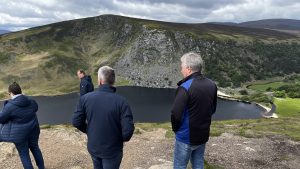SUAS Project Hosts German Study Visit
Earlier this week, the SUAS Pilot Project welcomed a visiting group from ‘Grünlandzentrum -Niedersachsen/Bremen eV’, (The Grassland Centre), which operates in the northern German areas of Lower Saxony and Bremen.
The group of 37, made up of farmers, industry, journalists and other interested parties, are in Ireland for a 6 day a study trip. With an action-packed itinerary that sees them travel through Ireland, visiting organisations, farmland, producers and a number of other stops to collectively broaden their knowledge of Ireland’s agriculture and agrifood sectors and the systems that support them.
Keen to discover how the SUAS Project is working collaboratively with hill-farmers across 25 sites in the Wicklow and Dublin Uplands, the group were very taken by the model of aligning conservation of upland habitats with sustainable grazing and land management practices.
Their day in Co. Wicklow began with an organised presentation and Q&A session with Declan Byrne, Project Manager of the SUAS Project in the Park Hotel in Newtownmountkenndy, before embarking onto their coach to make a multi-stop tour of a number of upland locations to view first-hand the work of the SUAS Project.
Beginning with a stop to Ballyremon Commons, close to townland of Calary, the group were introduced to a number of SUAS-led initiatives visible on the surrounding slopes. With a panoramic view, attention was directed to the Glencap Commons that surrounds the popular Great Sugar Loaf, where several initiatives are in operation to remove invasive tree species, tree planting of native trees, the introduction of sustainable grazing management and other vegetation management practices. On the opposite side of the plateau, on the slopes of Djouce and White Hill, Powerscourt Paddocks and the Glasnamullen Commonage have undertaken similar initiatives along with bracken control and the use of controlled burning to create the mosaic of habitats that features in their sustainable management plan.


Next on the list, was the captivating setting of the famed Luggala estate which managed to easily inspire both photos and numerous questions. The 5,000 acre private estate has begun an extensive restoration project centred around a long-term environmental management plan that includes woodlands, upland habitats, watercourses, lakes and abundant wildlife – something recently recognised with Micheal Keegan, the estate manager, being nominated for a “Farming For Nature Award’. The SUAS project has supported this impressive plan by collaborating with three key initiatives in different parts of the SAC designated estate; tree-planting to increase biodiversity and riverbank stabilisation, mechanical heather cutting to diversify habitats and the introduction of grazing cattle suitable for upland conditions. The roaming cattle assist in naturally managing habitats in a number of ways due to their diet and roaming patterns.
The final stop, close to the Sally Gap crossroads, was to examine recent tree-planting along three brooks that form part of the Cloghoge River catchment area that feeds the iconic Lough Tay or ‘Guinness Lake” as its also known. These sites which sit inside the Wicklow Mountains National Park, were selected by the Ballinstoe Commonage Group – formed under the SUAS Project’s facilitated process to create and formalise commonage groups. The 7 shareholders who are collectively participating in the project, agreed a works programme with the National Parks and Wildlife Service, and received training and guidance from the Project’s consulting ecologist, Faith Wilson, in advance of undertaking the task.
Planting into these sites assists to stabilise the riverbanks and reintroduces native trees into higher elevations. In time, these trees will provide diversification to the existing habitats, offer shelter for wildlife, protect water quality and introduces a valuable seed source to naturally expand the positive intervention measure through winds and the adjacent river flow – that ultimately feeds the Avonmore and Avoca rivers.
Leading the delegation was Dr Arno Krause, Managing Director of the Grassland Centre, who visited the uplands in 2019, as part of an EU delegation focussed on agriculture research. During that 3 day conference, the SUAS Project welcomed attendees from 22 EU member states during a field trip and presentation hosted in Laragh. Impressed with the locally-led model that sought to bring agriculture and conservation goals together, Dr Krause insisted that a field trip to the Wicklow Uplands was included to their current Irish study trip.
Initially founded as a project, the Grassland Centre, has grown to become a well-respected non-profit organisation which works with farmers, scientists, politicians and associations, conducting diverse research and hosting study trips for national and international visitors. Principally interested in dairy farming, and the farming practices that support it, the centre also studies, advises and project manages on a broad range of topics like water management, biodiversity and environmental protection, climate change and innovation. Offering networking opportunities and a forum between all of the many parties, is also a key function of the organisation – similar to that of Wicklow Uplands Council.
The group’s curiosity during their time in Wicklow was very welcome, and in keeping with the principles of shared learning and knowledge exchange, the SUAS Project learnt much of the research being carried out by the centre and also the high production systems utilised in northern Germany. It is great to see continued interest of the SUAS Project from across Europe, who are keen to see how locally- led schemes can address local challenges through collaboration and the innovation of bringing hill-farmers together to sustainably manage habitats and reverse the decline of the uplands’ delicate biodiversity.
Thanks to the group for including The SUAS Project to its itinerary and we hope your Irish study trip is both enjoyable and invaluable.
– Featured photos highlight some of the locations and the on-site demonstrations given by Declan Byrne with translation and shared dialogue from Dr Arno Krause.






